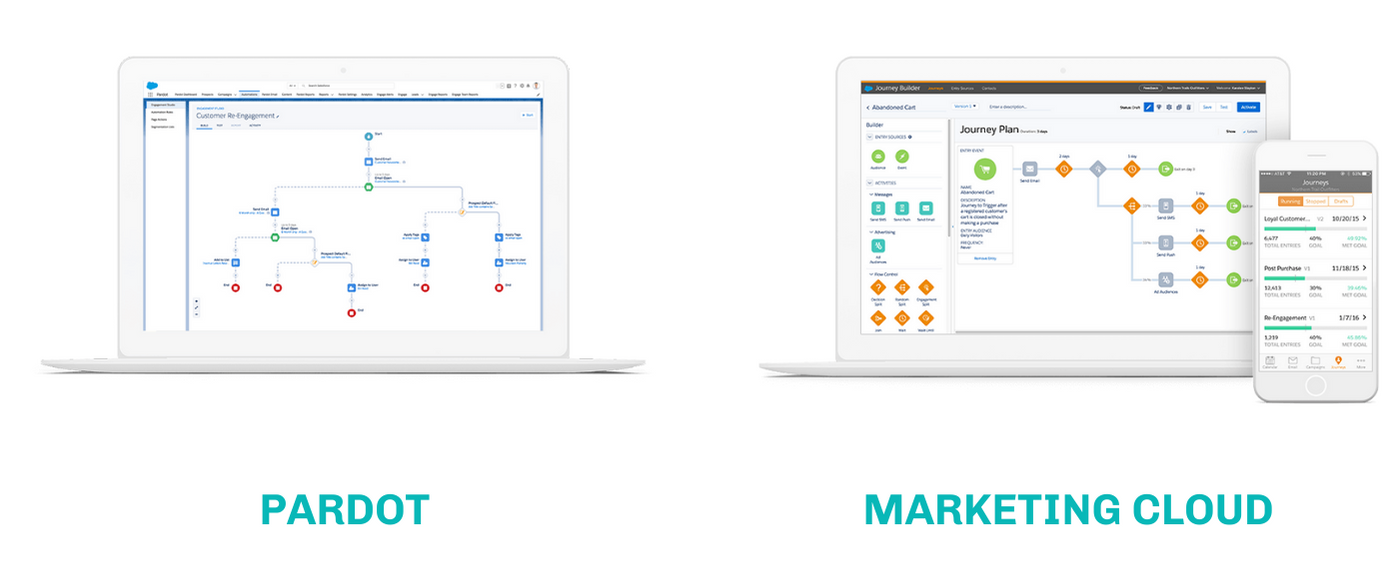When researching marketing automation on the Salesforce platform, you will be faced with two options: Pardot or Marketing Cloud. But what are the key differences when it comes to Pardot vs Marketing Cloud?
You will hear the same story during marketing automation platform comparison – on the surface, both tools appear to have many similarities. In reality, you’ll find that Marketing Cloud and Pardot are very distinct.
If you’re confused, you’re not alone. I worked as a Salesforce marketing automation consultant and was frequently asked questions like:
- Do Marketing Cloud and Pardot do the same thing?
- Is Pardot part of Marketing Cloud?
- Is one the ‘dummies’ version of the other? In other words, is one the low budget/small business/no technical skill option?
The answer to all the above questions is no.
Typing ‘Salesforce marketing automation’ into Google is bound to confuse you even further. You’ll see a smattering of ‘Pardot’, ‘Marketing Cloud’ and others amongst the results:

The Differences Between Pardot and Marketing Cloud
How is Pardot different from Marketing Cloud? I’m going to compare ‘Pardot vs Marketing Cloud’, debunk some myths, and provide you with some questions to ask yourself (so you can come to your own conclusions).

Above: the visual campaign automation tools compared: Pardot (Engagement Studio) and Marketing Cloud (Journey Builder)
| Pardot | Marketing Cloud | |
|---|---|---|
| One-line pitch: | “Powers your marketing and sales success by improving alignment between teams, driving and nurturing new leads” | “Grow relationships and revenue with seamless experiences from ad to account, email to e-commerce, social to service, and more” |
| Main differentiator: | Used for ‘considered purchases’ where there are long sales cycles and multiple decision-makers. That’s why Pardot is known as a B2B marketing tool. | Best suited to transactional purchases across multiple marketing channels. That’s why Marketing Cloud is known as a B2C marketing tool. |
| Marketing channels: | Email, social media* | Email, social, SMS, display advertising |
| Typical use cases/keywords: | Lead generation, lead scoring, lead assignment, email nurture campaigns, content marketing, webinar marketing, account-based marketing. | Real-time messaging, cross-channel marketing, mobile marketing, social media engagement, display advertising, e-commerce. |
| Ideal industries: | Professional services (note: Pardot is not industry-specific providing the organization meets the ‘main differentiator’ criteria) | Retail, FMCG, health & beauty, travel & leisure, nonprofit etc. |
| Technical knowledge and skills required: | Designed as WYSIWG**. Can be managed by a certified Pardot Specialist (in a standard setup). | Has a range of ‘Builders’ and ‘Studios’, some of which require specialization. Data management in Marketing Cloud is more complex than in Pardot. |
| Licensing/add-on products: | Pardot is comprehensive, however, some advanced features (analytics, AI-enabled features) are likely to be add-ons. | Marketing Cloud is sold in modules. Check which marketing channels, capabilities, and reporting will be included in your account before you purchase. |
| Integration with the Salesforce platform: | Aligned with Sales Cloud. This means that Pardot ‘talks’ to many of the standard Salesforce objects (Leads, Contacts, Opportunities). Pardot took it a step further to now use the same Campaigns as you do in the Pardot app. Other marketing objects are now built on the core platform (eg. emails, landing pages). Some of your Pardot database still exists off-platform. | Salesforce Marketing Cloud is not built on the core Salesforce platform; instead, connectors are used to sync data bidirectionally between the two. Once you realize how much power SMFC wields, you can understand why it’s deserving of its own platform. |
| Price: | $ | $$ |
*as Pardot is increasingly more closely integrated with the Salesforce platform, customers can take advantage of Salesforce functionality or trusted third-party providers, for SMS and more.
**what you see is what you get.
Frequently Asked Questions (and Debunking Myths)
‘Is Pardot a part of Marketing Cloud?’ and ‘Is Pardot Included in Marketing Cloud?’
It depends on how you interpret ‘part of’, which could mean two things:
- Built on the same product architecture.
- Marketed under the same brand umbrella.
Built on the same product architecture = no, Pardot is partly on its own platform, and partly on the core Salesforce platform. Marketing Cloud still exists on its own, not on the core Salesforce platform.



Marketed under the same brand umbrella = yes, Pardot is currently marketed alongside the Marketing Cloud product suite. Pardot went through a transition period – first independent, then aligned with Sales Cloud (as the two became increasingly integrated), and now it is advertised under the ‘Marketing Cloud’ umbrella. Most importantly, the two a) entail a separate license cost, and b) are not directly connected.



‘Pardot is an email marketing tool’:
Sure, the primary marketing channel Pardot handles is email; however, you would be a fool to conclude that Pardot only handles mass mailing.
Pardot is designed to automatically segment your database in line with prospect behavior and what’s happening in your CRM. You can combine these data points and only send emails when relevant – that’s where you will get value out of Pardot, and justify its price tag.
However, Pardot does handle other channels:
- There’s an assumption that B2B sales require a more tactful ‘high-touch’ approach from a sales rep.
- The tools available in Pardot for social posting, SMS, etc. are not as fully-fledged/at your fingertips as they are in Marketing Cloud. Marketing Cloud has dedicated ‘Studios’ and ‘Builders’ for each marketing channel.
“Pardot is for organizations with smaller budgets”:
While it’s true that Pardot has a lower license price point, it’s not as simple as that!
Organizations of all sizes and budgets use Pardot. Unfortunately, some organizations are tempted by the lower price point and opt for Pardot for this reason alone – rather than Marketing Cloud, even if it is a better-suited option.
These organizations may find that they spend more time and money on customizations and integrations in the long run – the saying ‘don’t cut corners’ is very true in this instance.
‘Pardot is for non-technical teams, without technical resource in-house’:
As I highlighted under ‘technical knowledge and skills required’ in the comparison table, Pardot has been designed to be WYSIWYG (what you see is what you get). This keeps users from delving ‘under the hood’, which makes Pardot harder to ‘break’. To truly maximize Pardot, however, you do need specialists on hand with both technical skills and marketing acumen – otherwise, you will be restricted to ‘cookie-cutter’ use cases.
In a standard setup without too many complex, non-standard processes, Pardot can be managed by a certified Pardot Specialist, with ‘clicks not code’.
Marketing Cloud has a range of ‘Builders’ and ‘Studios’, some of which require specialization. Data management in Marketing Cloud is more complex than in Pardot, often requiring development knowledge.
Having said that, once a Marketing Cloud is set up in line with the datasets/segmentation/ETL activities a marketing team needs, it can be used by a non-developer quite comfortably.
To conclude, the time required to learn Pardot is far less than Marketing Cloud.
Can You Use Both Marketing Cloud and Pardot?
Yes! You can use Marketing Cloud and Pardot together if you have the budget to spend! It’s usually a case of:
- Organizations don’t have the budget for both, and so ‘shoehorn’ the processes they would have implemented in the other platform into the one platform.
- Organizations do have the budget for both, but aren’t aware they need both.
So, perhaps it’s not a case of ‘Pardot vs Marketing Cloud’ after all. Here’s an inside view of how Hermann Miller uses Pardot and Marketing Cloud together:
Using Salesforce Marketing Cloud and Pardot Together – a Story of Two Cars
If you identify the use cases, then it’s worth considering using both solutions. BUT try not to get carried away with the shiny toys. There are ways to adapt Pardot for B2C marketing (one project I worked on – I don’t recommend it), and ways to adapt Marketing Cloud for B2B marketing.
As I said before, don’t simply choose Pardot for its cheaper price tag if you know, deep down, you have a B2C use case.
Which Is Right for You?
Hopefully, the information so far has helped ‘lift the fog’ and point you in the right direction. Here are some questions you can ask yourself:
- Does your organization have ‘considered purchases’ where there are long sales cycles and multiple decision-makers? = Use Pardot
- Is your sales process managed with Leads and Salesforce Opportunities? = Use Pardot
- Does your organization have ‘transactional purchases’ across multiple marketing channels? (and e-commerce) = Use Marketing Cloud
Summary
There are key differences between Pardot and Marketing Cloud – factors such as how long your sales cycle lasts, how many decision-makers influence it, and which marketing channels you use heavily, will clearly guide you towards which tool you should use.
Still unsure? There are plenty of Salesforce consultancies that will be able to advise you further. Finally, try not to make quick, rash buying decisions; go into the evaluation stages of your Pardot/Marketing Cloud with your mind clearer on the factors you should be considering. Is it a case of Pardot vs Marketing Cloud, or Pardot and Marketing Cloud?
This Pardot article written by:
Salesforce Ben | The Drip
Lucy Mazalon is the Head Editor & Operations Director at Salesforceben.com, Founder of THE DRIP and Salesforce Marketing Champion 2020.
Original Pardot Article: https://www.salesforceben.com/the-drip/pardot-vs-marketing-cloud/
Find more great Pardot articles at www.salesforceben.com/the-drip/
Pardot Experts Blog
We have categorized all the different Pardot articles by topics.
Pardot Topic Categories
- Account Based Marketing (ABM) (8)
- Business Units (13)
- ChatGPT / AI (3)
- Completion Actions (5)
- Connectors (10)
- Custom Redirects (4)
- Demand Generation (8)
- Dynamic Content (5)
- Einstein Features (11)
- Email Delivery (18)
- Email Open Rates (3)
- Pardot A/B Testing (2)
- Email Mailability (16)
- Do Not Email (1)
- Double Opt-in (2)
- Opt Out / Unsubscribe (14)
- Email Preferences Page (6)
- Engagement Studio (14)
- Industries (1)
- Non Profit (1)
- Landing Pages (10)
- Lead Generation (1)
- Lead Management (12)
- Lead Routing (2)
- Lead Scoring (15)
- Leads (3)
- Marketing Analytics – B2BMA (9)
- Marketing Automation (1)
- Marketing Cloud (2)
- Marketing Cloud Account Engagement (4)
- New Pardot Features (6)
- Opportunities (2)
- Optimization (3)
- Pardot Admin (62)
- Duplicates (1)
- Marketing Ops (1)
- Pardot Alerts (1)
- Pardot API (2)
- Pardot Automations (3)
- Pardot Careers (12)
- Pardot Certifications (4)
- Pardot Consulting (1)
- Pardot Cookies (3)
- Pardot Custom Objects (3)
- Pardot Email Builder (7)
- Pardot Email Templates (9)
- HML (6)
- Pardot Events (16)
- Pardot External Actions (1)
- Pardot External Activities (4)
- Pardot Forms (27)
- Form Handlers (7)
- Pardot Integrations (21)
- Data Cloud (1)
- Slack (1)
- Pardot Lead Grading (5)
- Pardot Lead Source (2)
- Pardot Lightning (1)
- Pardot Migration (1)
- Pardot Nurture / Drip Campaigns (1)
- Pardot Personalization (3)
- Pardot Profiles (1)
- Pardot Releases (19)
- Pardot Sandboxes (2)
- Pardot Segmentation (4)
- Pardot Strategy (7)
- Pardot Sync (2)
- Pardot Sync Errors (1)
- Pardot Tracker Domains (5)
- Pardot Training (3)
- Pardot Vs Other MAPs (4)
- Pardot Website Tracking (2)
- Reporting (22)
- Salesforce and Pardot (29)
- Marketing Data Sharing (2)
- Pardot Users (3)
- Salesforce Automation (4)
- Salesforce Flows (1)
- Salesforce Campaigns (20)
- Salesforce CRM (3)
- Record Types (1)
- Salesforce Engage (3)
- Salesforce Queues (2)
- Security and Privacy (1)
- Tags (3)
- The Authors (483)
- Cheshire Impact (9)
- Greenkey Digital (47)
- Invado Solutions (37)
- Jenna Molby (9)
- Marcloud Consulting (6)
- Nebula Consulting (53)
- Pardot Geeks (38)
- Salesforce Ben | The Drip (235)
- SalesLabX (2)
- Slalom (2)
- Unfettered Marketing (45)
- Uncategorized (1)
- Website Tracking (2)
- Website Search (1)
More Pardot Articles
See all posts
This Pardot article written by:
Salesforce Ben | The Drip
Lucy Mazalon is the Head Editor & Operations Director at Salesforceben.com, Founder of THE DRIP and Salesforce Marketing Champion 2020.
Original Pardot Article: https://www.salesforceben.com/the-drip/pardot-vs-marketing-cloud/
Find more great Pardot articles at www.salesforceben.com/the-drip/




